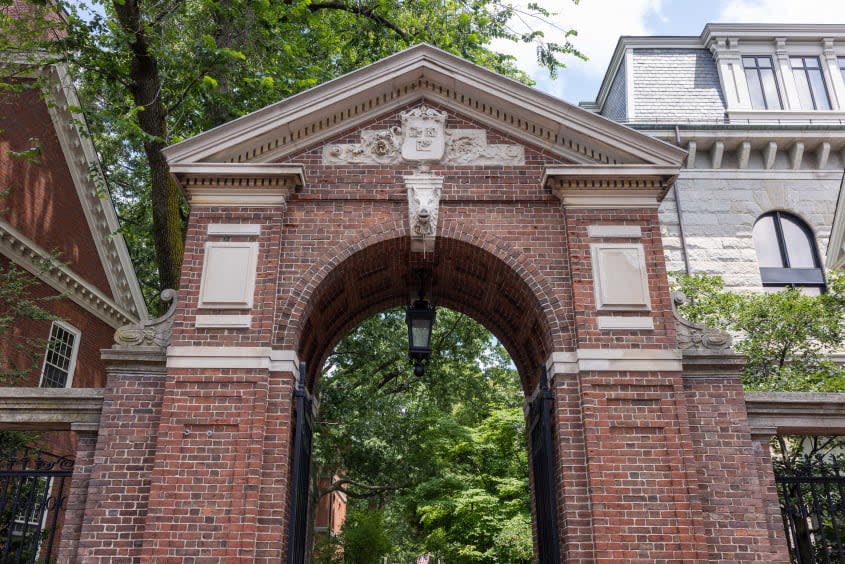How wealth impacts college admissions

College admissions have taken center stage as legal battles are waged to change how some of America's most elite colleges build their student bodies. And the U.S. Department of Education has launched a civil rights investigation into Harvard University's legacy admissions policy that benefits relatives of alums.
The DOE's Office for Civil Rights started an investigation after a complaint was filed by advocacy groups challenging Harvard's long-standing practice of favoring legacy applicants. The complaint came just days after the Supreme Court ruled in June that using race-based affirmative action in college admissions is unconstitutional. The complaint alleges that the university grants "special preference in its admissions process to hundreds of mostly white students — not because of anything they have accomplished but rather solely because of who their relatives are."
A recent study affirms that some of the most elite colleges have admissions policies that favor wealthy students. The findings show that the policies amount to "affirmative action for the children of the 1 percent, whose parents earn more than $611,000 a year," The New York Times reported. The study shows that wealthy students are more likely to be admitted into the country's best institutions even when they have similar test scores to less affluent students.
How the wealthy get a leg up
Children from more affluent backgrounds tend to have higher test scores and grades than other students due to the resources available to them. They are also more likely to apply to Ivy League schools and other competitive universities. But the study published by Opportunity Insights, a group of economists studying inequality at Harvard, shows that these aren't the only reasons they are overrepresented in the student body.
Economists Raj Chetty and David J. Deming, of Harvard University and John N. Friedman of Brown University, conducted the study and focused on data from the eight Ivy League universities, along with Duke, MIT, Stanford and the University of Chicago, together known as the Ivy Plus. They found that among applicants with the same SAT or ACT scores, the colleges favored legacy applicants and recruited athletes.
Students from private schools were given higher nonacademic ratings for factors like glowing recommendations, compelling essays and personal statements. This explains approximately 30% of the advantage kids from the wealthiest 1% have. Legacy admissions comprised 46% of their advantage, and recruiting athletes from expensive sports like fencing, tennis, rowing or lacrosse made up 24%. With these advantages, applicants from families in the top 1% were 34% more likely to be admitted than the average student, and those in the top 0.1% were more than twice as likely, independent of test scores.
What research reveals about Ivy Plus schools
The study's results reveal these colleges' critical role in shaping the country's upper echelon. Attending one of these selective schools increases a student's chance of being in the top earning bracket by 60% and "has even larger impacts on other nonmonetary measures of upper-tail success, such as attending an elite graduate school or working at a prestigious firm," the economists noted. They concluded that the schools "currently amplify the persistence of privilege across generations." Still, they can "diversify the socioeconomic backgrounds of America's leaders by changing their admissions practices."
Even though they only graduate less than half a percent of Americans, it's important to focus on the 12 Ivy Plus colleges when considering how to address inequality, Chetty told Annie Lowrey at The Atlantic. If you look at "people in positions of great influence," like politicians, journalists and other industry leaders, "an incredibly disproportionate number" come from those schools, he added. "To the extent those folks have a big influence on lots of other people's lives, diversifying who is in those positions matters." This demonstrates that elite colleges and universities are "worth it," as they "really are different in terms of propelling a given student into the country's ruling class," Lowrey explained. The Times called the results the "clearest picture yet of how America's elite colleges perpetuate the intergenerational transfer of wealth and opportunity."
Allison Schrager of Bloomberg believes the study perpetuates an "unhealthy obsession with the 1%" and there are more pressing issues regarding inequality in America. The issue of elite college admissions is another problem that's "too centered on the competition between the upper-middle class and the rich," she opined. If the goal is to increase social mobility and overall prosperity, Schrager added, "America should worry less about admissions to elite schools and more about K-12 education, job retraining, and making the labor market more fluid for people who didn't happen to go to the right school."

